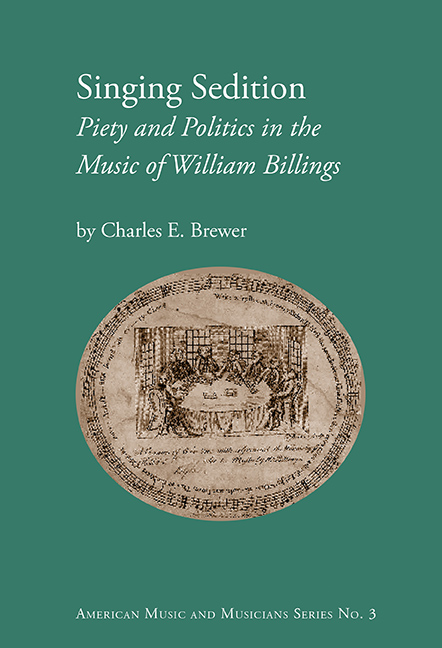Book contents
- Frontmatter
- Table of Contents
- List of Illustrations, Musical Examples, and Tables
- Prologue
- Acknowledgements
- Abbreviations
- Part I Rebellious Voices in Billings's Boston
- Part II Singing the Rebellion
- Chapter Three Shiloh and the Meanings of Christmas
- Chapter Four Billings's Anthems: Lamentation to Independence
- Chapter Five “Victory that Day was Turned into Mourning”
- Chapter Six “I Am the Rose of Sharon”: Rev. Samuel Cooper and William Billings
- Chapter Seven “Peace be on Earth, Good Will towards Men”
- Epilogue
- Appendices
- Bibliography
- Index
Chapter Five - “Victory that Day was Turned into Mourning”
from Part II - Singing the Rebellion
- Frontmatter
- Table of Contents
- List of Illustrations, Musical Examples, and Tables
- Prologue
- Acknowledgements
- Abbreviations
- Part I Rebellious Voices in Billings's Boston
- Part II Singing the Rebellion
- Chapter Three Shiloh and the Meanings of Christmas
- Chapter Four Billings's Anthems: Lamentation to Independence
- Chapter Five “Victory that Day was Turned into Mourning”
- Chapter Six “I Am the Rose of Sharon”: Rev. Samuel Cooper and William Billings
- Chapter Seven “Peace be on Earth, Good Will towards Men”
- Epilogue
- Appendices
- Bibliography
- Index
Summary
It is somewhat misleading to speak of a funeral service in connection with the lives of New-Englanders in the colonial period since it was not a function that traditionally took place in a church. The basic statement defining the burial customs for colonial New England is found in the Directory for Publick Worship produced by the Westminster Assembly of Divines in 1644 and approved by Parliament in 1645.
When any person departeth this life, let the dead body, upon the day of Buriall, be decently attended from the house to the place appointed for publick Buriall, and there immediately interred, without any Ceremony… . [W]e judge it very convenient, that the Christian friends, which accompany the dead body to the place appointed for publick Buriall, do apply themselves to meditations and conferences suitable to the occasion: And that the Minister, as upon other occasions, so at this time, if he be present, may put them in remembrance of their duty. That this shall not extend to deny any civill respects or deferences at the burial, suitable to the rank and condition of the party deceased, while he was living.
Throughout the seventeenth and early eighteenth centuries, New England customs basically followed the pattern of a procession from the house of the deceased to a simple burial. Over time, however, traditions associated with the procession and burial, such as the giving of gloves or rings, grew in importance and cost. The extravagance associated with some of these events was probably due to the “civill respects or deferences” that were accorded to military officers, prominent merchants, politicians, and ministers. Eventually, the General Court passed legislative restrictions, and the non-importation agreements concerning British goods or the closing of Boston harbor in 1774 also limited their excess.
Rather than a specific funeral service, funeral sermons were most frequently preached on the Sabbath following the burial, within the context of a regular service, during which, music would have been expected. There is a memoir from the early nineteenth century, attributed to Samuel Gilman, that confirms this practice: ”… funeral anthems were sung on the Sabbath that immediately succeeded any interment in the parish.” Specific funeral services for individuals were apparently a later development in the eighteenth century and were most often only provided for significant members of the community.
- Type
- Chapter
- Information
- Singing SeditionPiety and Politics in the Music of William Billings, pp. 141 - 164Publisher: Boydell & BrewerPrint publication year: 2017

